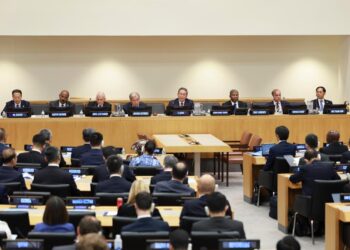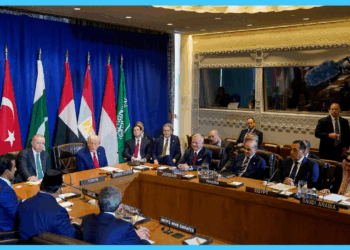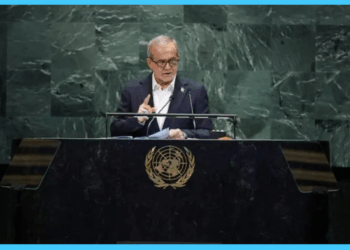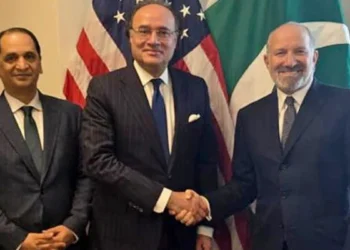KARACHI; The Pakistan Stock Exchange (PSX) witnessed a record-breaking rally on Thursday, surging by nearly 1,800 points as investor sentiment soared following the signing of a landmark mutual defence agreement between Pakistan and Saudi Arabia.
The benchmark KSE-100 Index climbed 1,775.65 points, or 1.14 percent, to close at 157,953.46 points – the highest level in the history of the exchange and just shy of the symbolic 158,000 milestone. Trading volumes also hit one of the highest levels in recent sessions, reflecting robust investor participation.
According to market analysts, the dramatic rise was directly tied to renewed investor confidence after Islamabad and Riyadh entered into the Strategic Mutual Defence Agreement, which pledges that an act of aggression against either country would be treated as an attack on both. The agreement was signed in Riyadh on Wednesday at Al-Yamamah Palace by Prime Minister Shehbaz Sharif and Saudi Crown Prince Mohammed bin Salman.
“This agreement has clearly bolstered market sentiment,” said Awais Ashraf, Research Director at AKD Securities. “The KSE-100 Index not only surged to an all-time closing high but also saw the second-highest trading volume of the year. Investors are optimistic that this pact will pave the way for stronger defence and economic ties, including an increase in Saudi investments in Pakistan and greater export opportunities for skilled labour.”
Landmark Strategic Shift
In a joint statement issued by both capitals, the two nations underscored that the agreement is built on decades of brotherhood, Islamic solidarity, and mutual security interests. The text declared that “any aggression against either country shall be considered aggression against both,” effectively placing the two states under a joint security umbrella.
The statement added that the accord aims to “develop aspects of defence cooperation and strengthen joint deterrence against any aggression,” while also contributing to peace and stability in the wider region.
The timing of the agreement comes against a backdrop of heightened regional instability. Following Israel’s unprecedented strike on Hamas leadership in Doha earlier this week, Gulf states have accelerated moves toward collective security arrangements. Analysts say the Pakistan-Saudi pact reflects both the urgency of current events and a desire to formalise a longstanding but often informal military partnership.
Historical Depth of Ties
Defence cooperation between Pakistan and Saudi Arabia dates back to the 1960s but gained momentum after the 1979 Grand Mosque incident, when Pakistani special forces were dispatched to support Saudi troops in reclaiming Masjid al-Haram. In 1982, the two countries institutionalised their security relationship through a bilateral security cooperation agreement, enabling Pakistani training and deployments on Saudi soil. At times, as many as 20,000 Pakistani soldiers were stationed in the Kingdom.
Saudi Arabia has also been a consistent buyer of Pakistani defence equipment, while Islamabad has benefited from Riyadh’s financial assistance and oil supplies during times of crisis.
In recent years, regular meetings of the Pakistan-Saudi Joint Military Cooperation Committee have sought to expand joint training, technology sharing, and counter-terrorism collaboration. February’s session in Riyadh had already hinted at new initiatives, but Wednesday’s agreement is widely seen as the most consequential upgrade of bilateral defence ties in decades.
Broader Implications
For Pakistan, the deal carries both strategic and economic weight. With its fiscal situation under strain, Islamabad sees Riyadh’s continued investment as a lifeline. At the same time, it positions Pakistan more firmly as a pan-Islamic security provider, strengthening its role in Gulf security.
For Saudi Arabia, the agreement enhances deterrence against threats from Iran, Houthi militias, and the broader turbulence in the Middle East. Riyadh also faces growing insecurity after Israel’s attacks in Gaza and beyond, including the recent strike in Qatar. Analysts believe these developments accelerated the decision to formalise the defence pact with Pakistan.
The new accord stands in contrast to Pakistan’s earlier defence alignments under Cold War-era treaties like SEATO and CENTO, which have long since faded. Current partnerships with China, Turkiye, and other Gulf nations remain vital, but few contain binding defence clauses. The Saudi agreement thus marks a unique and binding security partnership.
Market Response
Financial experts say that beyond the geopolitical significance, the pact signals renewed Saudi confidence in Pakistan’s stability – a factor that directly boosted equity markets. “The expectation of billions in Saudi investment across multiple sectors, particularly energy, infrastructure, and labour exports, is fueling optimism among investors,” one senior trader noted.
The KSE-100’s record close on Thursday underscored how quickly geopolitics can translate into economic sentiment. While global uncertainties remain, Pakistan’s latest diplomatic success has, at least temporarily, bolstered both its markets and its regional standing.
























